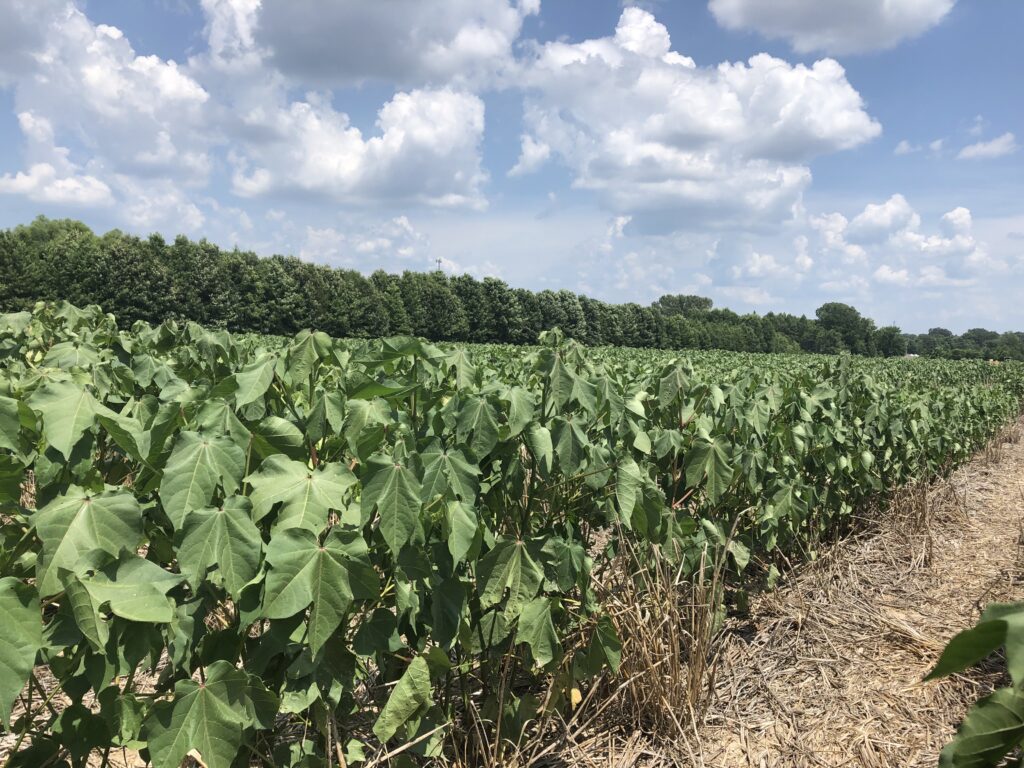 Everyone seems to have an opinion on watering cotton in humid regions- do this, don’t do that unless this happens, etc. Even when you do everything right in a normal year, dryland cotton in TN often comes out close (and occasionally ahead) of irrigated. In a normal year, cotton often finds its way into the more droughty areas of the farm and is often bumped out from under pivots to make way for corn or soybeans which typically respond better to irrigation. Unfortunately, it looks like our response to irrigation during 2022 will more closely mirror that of TX or AZ than what we’ve seen in TN during the past few years. Still, there are a few important things to keep in mind to maximize the response of cotton to irrigation. In this blog, Dr. Avat Shekoofa and I have compiled a few of our ‘dos and don’ts’.
Everyone seems to have an opinion on watering cotton in humid regions- do this, don’t do that unless this happens, etc. Even when you do everything right in a normal year, dryland cotton in TN often comes out close (and occasionally ahead) of irrigated. In a normal year, cotton often finds its way into the more droughty areas of the farm and is often bumped out from under pivots to make way for corn or soybeans which typically respond better to irrigation. Unfortunately, it looks like our response to irrigation during 2022 will more closely mirror that of TX or AZ than what we’ve seen in TN during the past few years. Still, there are a few important things to keep in mind to maximize the response of cotton to irrigation. In this blog, Dr. Avat Shekoofa and I have compiled a few of our ‘dos and don’ts’.
Category Archives: Cotton
Weed Control During Drought Stress
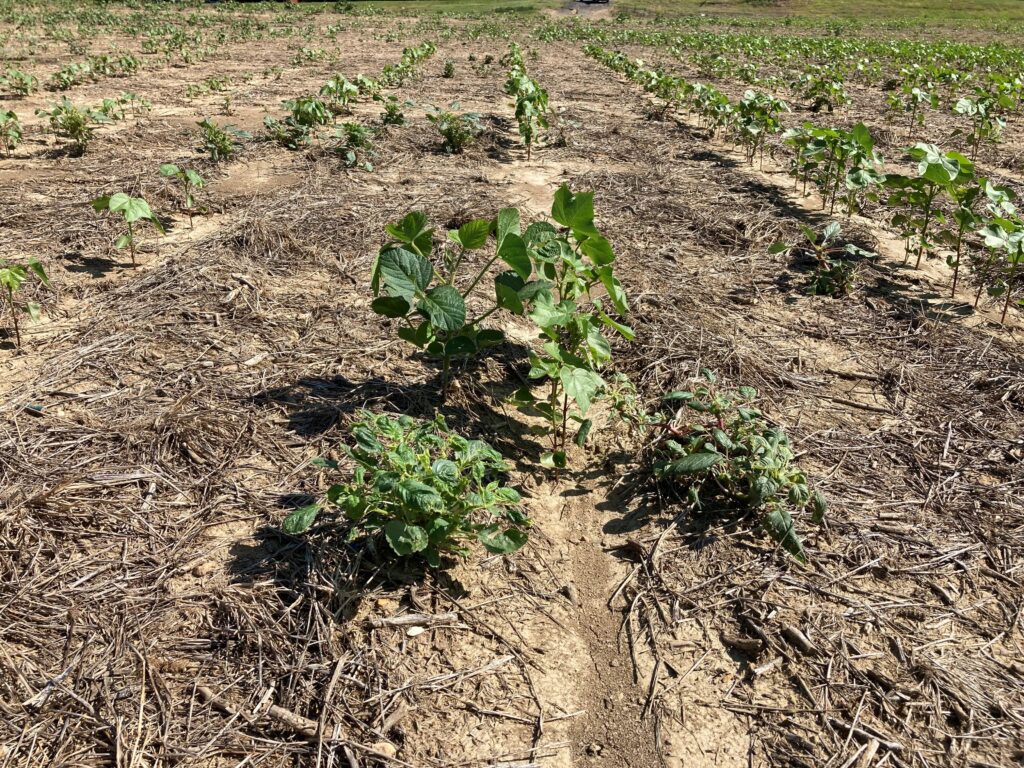
The forecast, unfortunately, would suggest we are in store for another hot and dry week. That persistent weather pattern makes the challenging aspect of weed control more difficult which leads to questions. One common one is how long a residual herbicide will persist on the soil surface before a rain activates it? Another common question during long stress periods is the poor weed control from a POST application due to resistance or dry weather. Continue reading
Spider Mite Numbers Increasing in Cotton
I’ve received several phone calls about spider mites increasing in cotton around West Tennessee. Spider mites favor hot, dry weather and will often become an issue after plant bug applications are initiated. UT recommends treatment when 30-50% of plants are showing signs of injury and spider mites are still present. This may be too aggressive under low stress conditions, but most of the crop is currently under substantial heat and drought stress. Treatment options are fairly limited and most are mite specific. Abamectin based products are typically the first option because they are economical and effective. There are a couple different formulations of abamectin that are different lb/ai per gallon products. Below is a rate conversion of 0.15 lb ai/gallon formulations (Willowood Abamectin 0.15 EC, etc) to 0.7 lb ai/gallon formulations (Agri-mek SC 0.7, Willowood 0.7 SC, etc).
5.0 fl oz/a = 1.0 fl oz/a
7.0 fl oz/a = 1.5 fl oz/a
8.0 fl oz/a =1.75 fl oz/a
10.0 fl oz/a = 2.0 fl oz/a
Abamectin rates below 7.0 fl oz/a or 1.5 fl oz/a should be avoided due to potential resistance issues and the increased likely hood of retreatment.
Other mite products such as etoxazole (Zeal, Stifle) are mite growth regulators that work very well but are more expensive and somewhat slower than traditional miticides. Fenpyroximate (Portal) is a contact miticide that has a shorter residual than abamectin or etoxazole but works very well. Bifenthrin alone is not an adequate miticide and should be avoided.
Products used for controlling plant bugs, bollworms and stink bugs (OPs, pyrethroids) exacerbate mite populations and their use, especially during hot dry conditions, should be delayed until after bloom if possible. Mite populations can rebound quickly after miticide applications so diligent scouting is critical to slowing the spread of mites across a field.
Managing cotton plant growth as we move into July
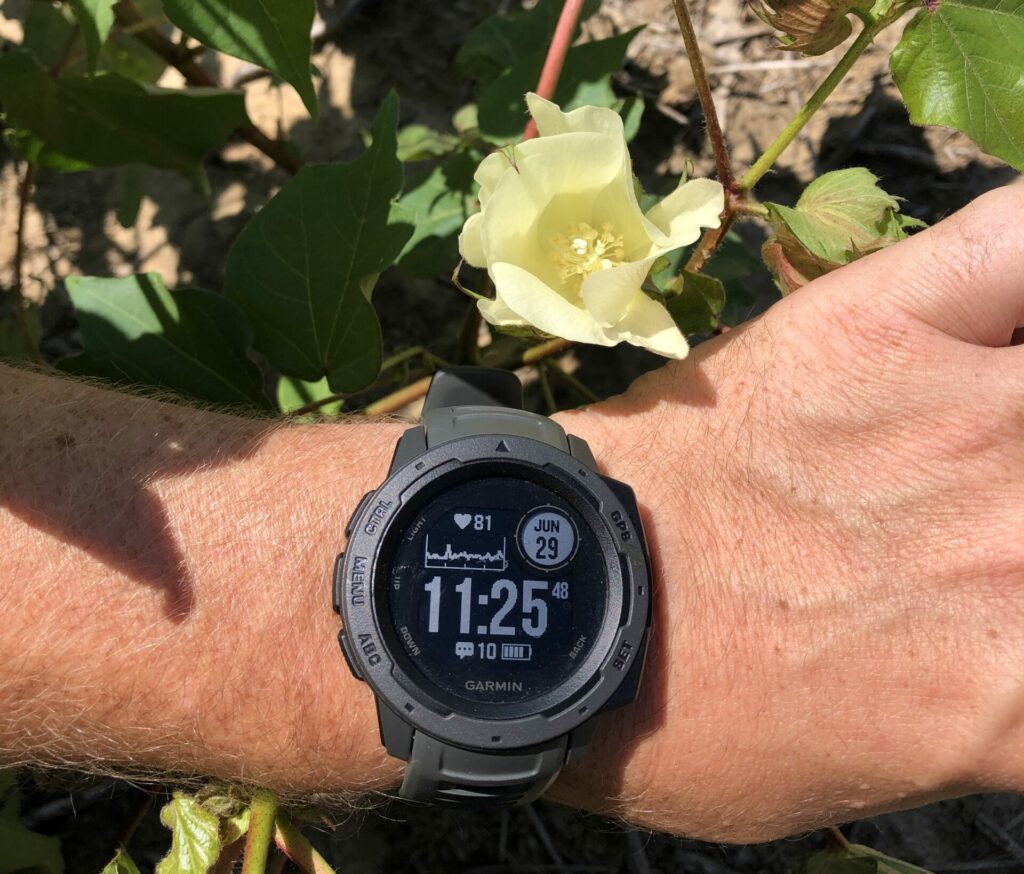 More times than not, when a cotton planter left a TN field in 2022, a thunderstorm bringing ~2″ of rain and cool weather would arrive 3 days later. I’ve walked more replants this year than ever before and unfortunately the old saying ‘if you are on the fence, keep it’ rarely applied; in many fields, we weren’t anywhere near the metaphorical fence. Still, Tennessee’s ragged cotton crop has generally turned the corner and mid and late June have been cotton weather; our earliest cotton reached early bloom well prior-to the 4th. In this blog, I cover a few things to keep in mind as we begin to apply PGRs to more acres and look to push a few slower farms into ‘taking off’.
More times than not, when a cotton planter left a TN field in 2022, a thunderstorm bringing ~2″ of rain and cool weather would arrive 3 days later. I’ve walked more replants this year than ever before and unfortunately the old saying ‘if you are on the fence, keep it’ rarely applied; in many fields, we weren’t anywhere near the metaphorical fence. Still, Tennessee’s ragged cotton crop has generally turned the corner and mid and late June have been cotton weather; our earliest cotton reached early bloom well prior-to the 4th. In this blog, I cover a few things to keep in mind as we begin to apply PGRs to more acres and look to push a few slower farms into ‘taking off’.
2022 Cotton Variety Guide for Plant Growth Regulation
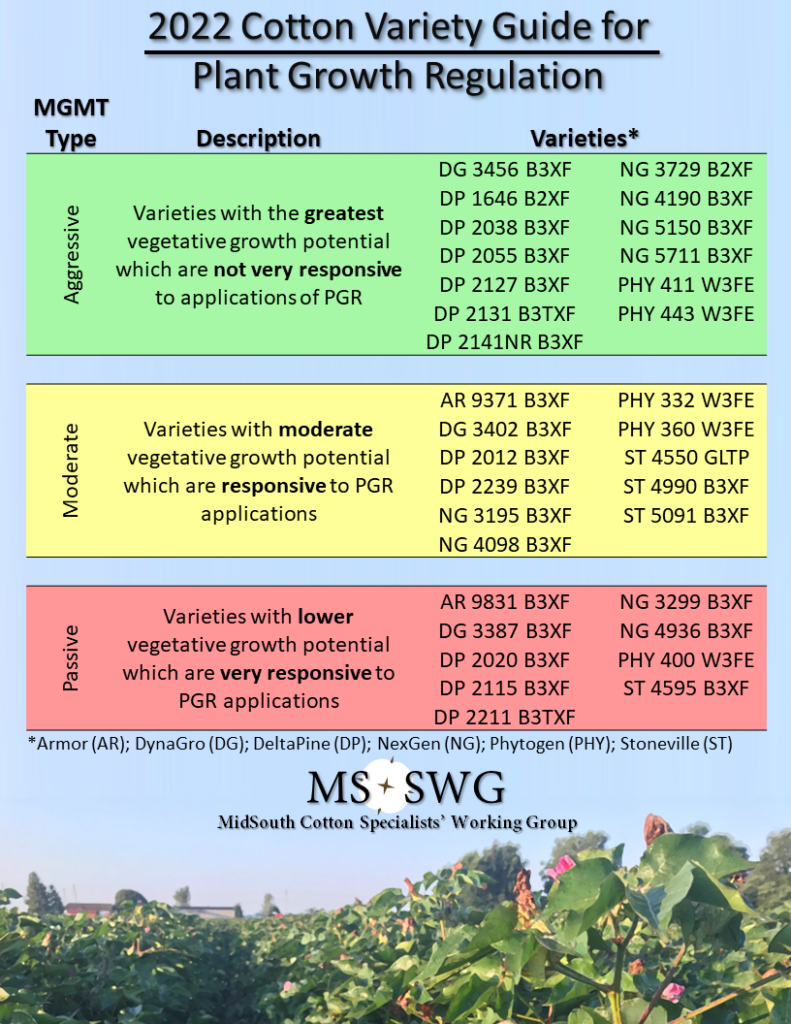 The MidSouth Cotton Specialists’ Working Group (MSCSWG) has compiled the 2022 Cotton Variety Guide for Plant Growth Regulation. This information was constructed based on the MSCSWG’s experience with each of the varieties, company ratings, and discussions with other agronomists. To access a pdf of the document, click the above image.
The MidSouth Cotton Specialists’ Working Group (MSCSWG) has compiled the 2022 Cotton Variety Guide for Plant Growth Regulation. This information was constructed based on the MSCSWG’s experience with each of the varieties, company ratings, and discussions with other agronomists. To access a pdf of the document, click the above image.
Management of Volunteer Xtendflex Soybeans in Xtendflex Cotton
What are some options to control volunteer XtendFlex soybeans in XtendFlex cotton fields? This issue is something that we need to do research on as there is no data. As such in answering the question one has to rely exclusively on experience. Unfortunately, all the experience that I and my Midsouth colleagues have does not hint at a real good option to remove these volunteers. Continue reading
Post-Direct and Hooded Application Options for Cotton
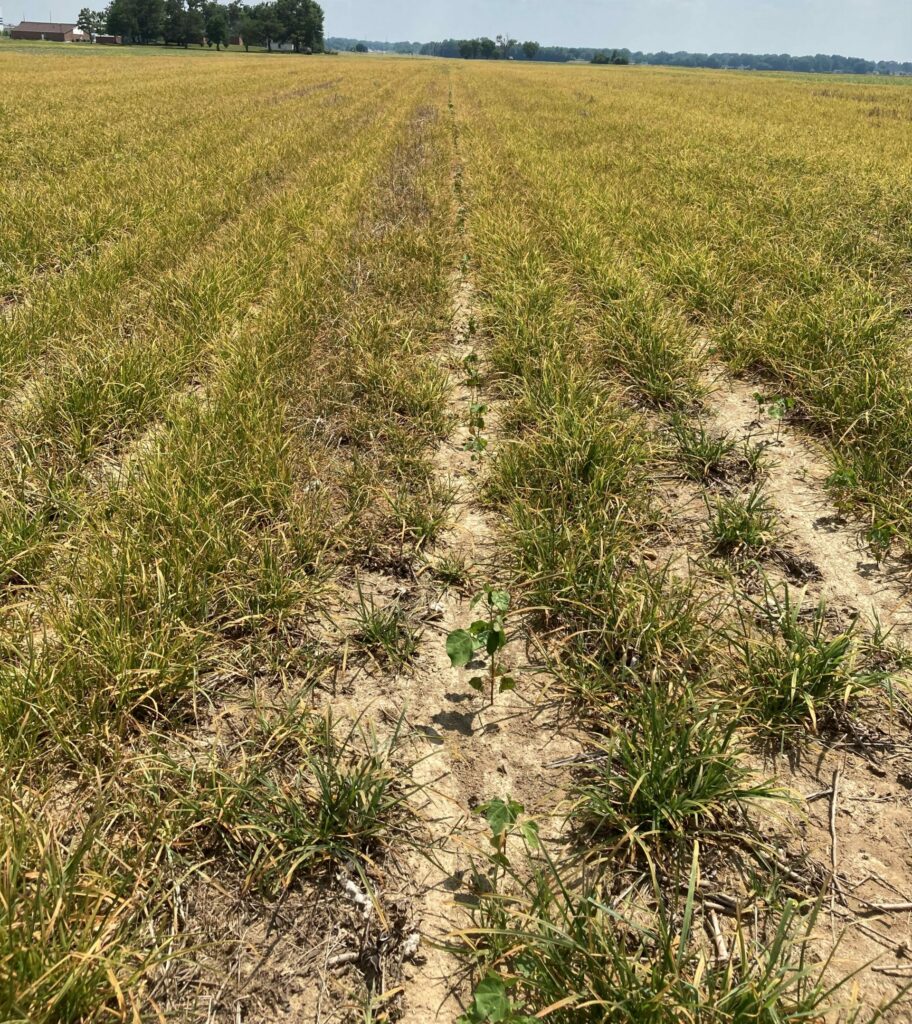
Some of the earlier planted cotton fields will soon be entering the true “laying it by” application timing. Given that some are clearly not successful spraying Palmer amaranth, goosegrass or junglerice with glyphosate + dicamba (Picture 1 and 2), going back to an “old school” layby is a good plan. Continue reading
Cotton Specialists’ Corner Podcast: PGR use on dry acres, farms with mixed maturity
We are quickly approaching the period of time in which we typically apply PGRs. Unfortunately, May was not kind and June has been dry. Many are struggling with figuring out when to start PGR applications and how aggressive we should be with that first application. In this blog, I link to our most recent Cotton Specialists’ Corner podcast on this very issue. This episode highlights several things to keep in mind before we run a stiff rate of PGR to an already stressed plant and potentially hurt yields.

